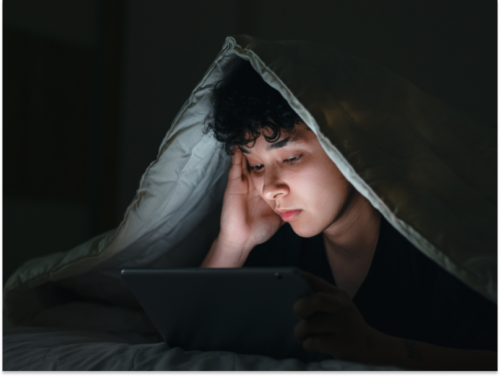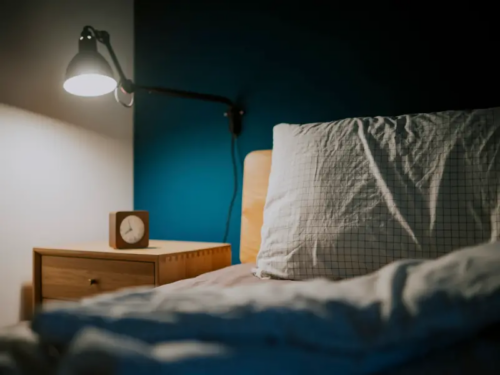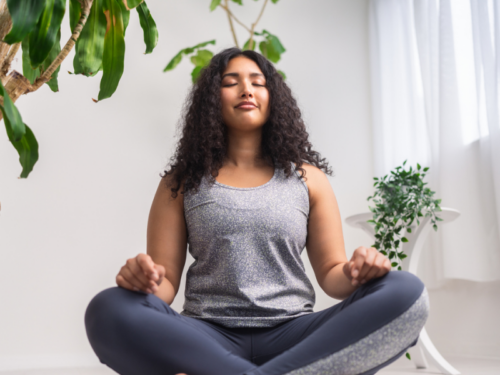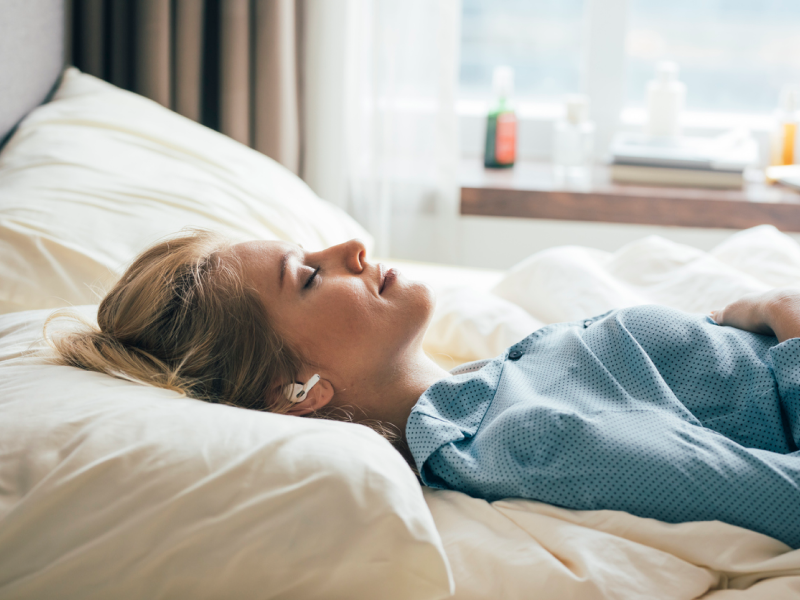
Table of Contents
Guided Sleep Meditation: Let Go of Anxiety & Calm Your Mind

Written By: Kera Passante, MS, LPC

Clinically Reviewed By: Dr. Don Gasparini
June 21, 2023
6 min.
Meditation activates the body’s relaxation response and calms the nervous system, which can help people manage anxiety and get better sleep. Keep reading for a step-by-step guided meditation for managing nighttime anxiety.
Learn more about our Clinical Review Process
Table of Contents
Guided meditation for sleep and anxiety: a step-by-step meditation
If anxious thoughts are keeping you up at night, here’s a simple step-by-step mindfulness meditation technique to use for managing nighttime anxiety. You should practice this guided meditation in a comfortable position, either sitting up or lying down. This can be in your bed, but it doesn’t have to be:
- Take a deep breath in, filling your lungs with fresh air, and slowly exhale, releasing any tension or stress from your body.
- Bring your attention to your body. Start by relaxing your forehead and temples. Allow any tension to melt away as you soften the muscles in your face. Next, relax your jaw and let it gently drop, releasing any clenching or tightness. Feel a sense of relaxation spreading through your cheeks, mouth, and chin.
- Bring your awareness to your neck and shoulders. As you inhale, imagine a warm, soothing light flowing down through your neck, relaxing and loosening any tightness. As you exhale, let go of any stress or tension stored in these areas.
- Move your attention down to your arms and hands. Feel the weight of your arms sinking into the surface you’re resting on. Allow your hands to relax completely, releasing any remaining tension.
- Shift your focus to your chest and abdomen. With each breath, imagine a wave of relaxation flowing through these areas, soothing any anxiety or restlessness.
- Bring your awareness to your back and spine. Visualize any tension or discomfort melting away, replaced by a deep sense of relaxation and ease.
- Now, direct your attention to your legs and feet. Imagine warm, comforting energy flowing through your legs, relaxing every muscle and bringing a deep sense of calmness to your feet.
- As you continue to breathe deeply and slowly, imagine yourself in a peaceful and serene place. It could be a beach, a forest, or any location that brings you a sense of tranquility. Take a moment to scan your body and notice if there are any areas that still hold tension. Send your breath to those areas, allowing them to release and relax.
- Visualize yourself surrounded by a soft, warm light that embraces you and fills you with a profound sense of relaxation and inner peace. Allow this light to wash away any remaining stress or worries.
- As you prepare for sleep, continue to breathe deeply and slowly. With each exhale, release any remaining tension or stress from your body and mind. Allow yourself to surrender to a state of deep relaxation. Stay in this state of relaxation for as long as you’d like, allowing yourself to drift off into a restful sleep. Know that you are safe, protected, and supported.

You’re not alone.
Personalized treatment for anxiety disorders from home.
Meditation for sleep and anxiety
Meditation is a practical tool that can help calm your mind, relax your body, and reduce stress, which can lead to better sleep and lower anxiety levels. By practicing meditation, you learn to focus your attention away from racing thoughts and release physical tension—tactics that can help you fall asleep and stay asleep. Although meditation is a helpful tool for managing anxiety and improving sleep quality, it is not a substitute for professional help from a mental health provider. Whether situational anxiety is keeping you up at night or you think you might have an anxiety disorder, therapy is essential for managing your mental health.
How does meditation help with anxiety?
Meditation helps with anxiety by promoting a state of relaxation and calmness. When you engage in meditation, you focus your attention and bring your awareness to the present moment, allowing you to let go of worries and anxieties about the past or future. Through deep breathing and mindful awareness, meditation activates the body’s relaxation response, which counteracts the stress response associated with anxiety. This helps to lower heart rate, reduce muscle tension, and regulate breathing, creating a sense of physical and mental relaxation.
Meditation also cultivates self-awareness and mindfulness, enabling you to observe anxious thoughts and emotions without judgment or attachment. By developing this non-reactive and compassionate attitude towards anxiety, you can gain a greater sense of control and reduce the impact of anxiety on your well-being. Regular meditation practice can enhance resilience, improve emotional regulation, and provide a valuable tool for managing and reducing anxiety symptoms over time, though, as mentioned, it is not a substitute for therapy and medication as needed.
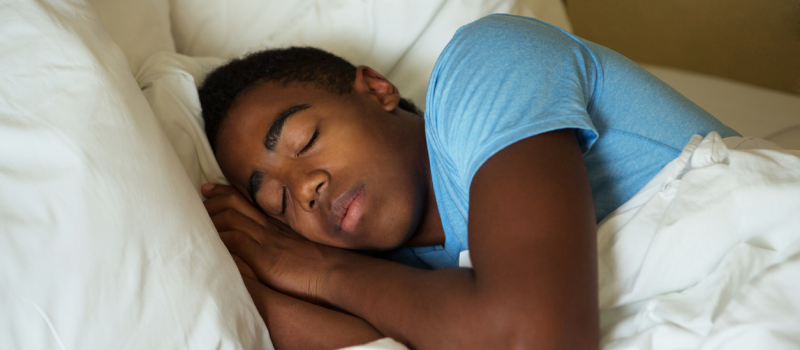
How does meditation help with insomnia?
Insomnia is a sleep disorder characterized by difficulty falling asleep, staying asleep, or experiencing non-restful sleep, leading to daytime fatigue and impaired functioning. Meditation can be beneficial for insomnia by addressing the underlying factors that contribute to sleep disturbances. When practicing meditation, you cultivate a state of deep relaxation and inner calm, which can help reduce the racing thoughts, worries, and anxiety that often accompany insomnia. By focusing your attention and gently redirecting your thoughts away from sleep-related concerns, meditation promotes a sense of mental tranquility and eases the mind into a more peaceful state conducive to sleep.
Regularly practicing meditation can actually help regulate your body’s stress response system, lower your physical arousal levels, and encourage a healthier sleep-wake cycle. By incorporating meditation into your nightly routine, you can create a soothing and mindful environment that supports restful sleep and helps alleviate the symptoms of insomnia.
If your insomnia persists for an extended period, despite trying various self-help techniques like meditation, or if it causes significant distress or impairment in your daily activities, it may be helpful to consult a healthcare professional or sleep specialist. They can evaluate your sleep patterns, identify any underlying causes or contributing factors, and recommend appropriate treatments or interventions to help you manage and improve your sleep.
Join the Charlie Health Library
Get mental health updates, research, insights, and resources directly to your inbox.
You can unsubscribe anytime.
Why might your anxiety be worse at night?
It’s common for anxiety — and other adverse mental health symptoms — to worsen at night. Here are some common reasons why your anxiety might be worse at night:
- Reduced distractions: With fewer activities and responsibilities to occupy our minds, anxious thoughts can become more prominent in the quietness of the night.
- Fatigue and exhaustion: After a long day, our mental defenses may be lower, making it easier for anxiety to take hold and intensify.
- Overthinking: The stillness of the night can provide an ideal environment for overthinking and dwelling on negative thoughts, which can contribute to heightened anxiety.
- Hormonal changes: Natural hormonal fluctuations that occur during the evening can impact our mood and anxiety levels, potentially making them worse at night.
- Lack of support: During the nighttime, we may have limited access to social support or professional help, which can make it more challenging to manage anxiety effectively.
- Fear of the unknown: The darkness and uncertainties associated with nighttime can trigger fears and worries, amplifying anxiety symptoms.
Everyone’s experience with anxiety is different, and these factors may vary from person to person. It's important to identify your personal triggers and develop coping strategies that work best for you to manage your anxiety—including seeking professional help as needed.
Meditation and mindfulness therapy for sleep and anxiety at Charlie Health
Charlie Health is committed to creating an unparalleled, multi-pronged approach to care for teens and their families, incorporating yoga, mindfulness, and meditation techniques into treatment—including for patients with anxiety disorder. If you think that you might benefit from an individualized mental health treatment plan, reach out to learn more today.
